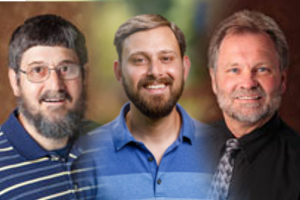
For the past few weeks, Bethel’s chapel has been focused on the Reformation; more specifically on some of the theological tenets that have evolved from the posting of the 95 Theses 500 years ago.
In an interesting move, Student Life has opted to not focus the discussion on the actual historical events that surrounded this event that changed the very face of Christianity. To discuss some of those historical events, as well as why this chapel series is not focusing on them, The Beacon talked with resident director John Kaehr, professor of history Dr. Dennis Engbreght and professor of history and philosophy Bro. Tim Erdel. Below are their answers to our inquiries.
Beacon: Why is Bethel doing this series about the Reformation? Kaehr: “When we were planning this out in late May, Shawn (Holtgren) mentioned ‘Hey, our chapel series falls right around the 500th anniversary of the Reformation.’ And we said ‘yeah we’d love to do (a series on) that.’” Beacon: What are some of the most important events of the Reformation? Engbreght: “Well I think it was the posting of the 95 Theses. Obviously, the church was in need of reform. It’s kind of a cycle; there were reformers before Luther and there were reformers after Luther. Unfortunately, the politicians got involved and some of them wanted to break from the church-state, and so they sided with Luther or Zwingli and you had a series of battles and wars. Which is sad, that wasn’t Luther’s intention.” Erdel: “In some ways, what I think is more important is what happened before the Reformation. There was the breaking off of the Eastern and Oriental Orthodox churches. Some of the problems that the Eastern Orthodox church had with the Catholic church were the same problems that Luther had. The other thing was the translation into the vernacular. The invention of the printing press had a huge impact. There were other reformations before this one, but why this one? The implications of reform could be spread in print.” Beacon: How is the current theological discussion in chapel relevant to our students? Erdel: “We’re just in a funny place right now, as a school. I think there’s a notion of ‘we’re Protestants, so we should claim these roots,’ but which of these roots? We’re not remotely Episcopalian or Lutheran, and no one really wants to claim Anabaptism.” Engbrecht: “I think the intent was ‘we need to engage our students in conversations’ and look at some of the things that have separated Catholics and Protestants as well as some of the things that, in recent years, has brought Catholics and Protestants together. So, all the solas.” Kaehr: “In our lives, when we struggle with issues of what makes me right and accepted by God, well then, ‘faith alone’ is for sure relevant today. When we struggle with issues of sin and how we are forgiven, ‘grace alone’ is for sure relevant to us today. When we are faced with a culture that resists authority ... – authority is challenged like crazy in our culture – well ‘sola scriptura’ speaks to a young growing part of the church. And then ‘Christ alone’ is just, all things are in him and he holds together all things. Of course, our faith is 100 percent about Jesus. And then for me the fifth point is ‘ok so why? Why is this all important?’ Because God has called me to live for his glory alone.” Beacon: Would it be beneficial to discuss the history of the Reformation movement in in chapel or in complement to the discussion in chapel? Kaehr: “I think the general populace of Bethel wouldn’t necessarily want to track with it. It’s a huge movement in the history of Christianity. You know some of our church history classes, if somebody wanted to do a one-off and like, ‘hey, here’s a four-hour seminar on just, the pure history of the Reformation.’ For some of the geeks around here, I would be a part of that .” What are your thoughts? Would a focus on history be beneficial? Is a discussion of theology a good fit for us today? Comment below or write a letter to the editor at wesley.lantz@bethelcollege.edu and tell us your thoughts.